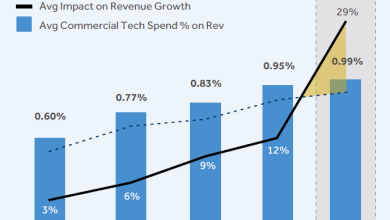
Business intelligence for financial services involves the use of technologies and strategies to analyze data and provide actionable insights. Integrating AI into financial business intelligence systems takes this a step further by enabling predictive and prescriptive analytics.
The Evolution of Financial Intelligence
Predictive analytics utilizes historical data to forecast future events, aiding businesses in anticipating market trends and adjusting their strategies accordingly. Prescriptive analytics takes it a step further by recommending actions to achieve desired outcomes.
An AI-powered financial intelligence system can analyze a company’s financial performance, market conditions, and competitive landscape to recommend the best investment strategies or cost-cutting measures.
The Role of Artificial Intelligence in Financial Services
Artificial intelligence in financial services has emerged as a game-changer, providing capabilities that extend far beyond human limitations. AI technologies such as machine learning, natural language processing, and robotic process automation are being harnessed to automate routine tasks, detect fraud, enhance customer service, and drive investment strategies.
For instance, AI-driven algorithms can analyze market trends and economic indicators at unprecedented speeds, providing traders and financial analysts with real-time insights. This allows for more informed and timely decisions, reducing the risk of losses and maximizing returns. Moreover, AI can process vast amounts of unstructured data, such as news articles and social media posts, to gauge market sentiment and predict stock price movements.
Financial Business Intelligence: Integrating AI for Enhanced Insights
Predictive analytics is a technique that analyzes the historical data that plays an important role in determining future occurrences that may likely happen, helping firms to prepare adequately for these occurrences by adjusting their strategy accordingly.
Even predictive analytics can provide forecasts, prescriptive analytics then extends to making recommendations on the desired actions to pursue. For instance, an AI-based mobile financial business intelligence system can evaluate the organization’s financial health, market trends, and competition to display the right portfolio choices or identify targeted cost reduction options.
Applications of AI in Financial Business Intelligence
Risk Management and Fraud Detection
AI algorithms can identify patterns and anomalies that may indicate fraudulent activity. By analyzing transaction data in real-time, AI can detect suspicious behavior and alert financial institutions before significant losses occur.
Customer Insights and Personalization
AI helps the financial institutions of today to obtain a better understanding of the activities and desires of their clients. Powerful algorithms enable the analysis of transaction histories, social media interactions, and more, all contributing to AI’s ability to construct deep customer profiles.
Automated Financial Reporting
The use of AI technologies can help make the preparation of figures, including financial reports, accurate and legal. Not only does it save time but also minimizes the chances of human mistakes that can take place in between the means of processing data and records.
The most sophisticated AI applications are capable of producing an analysis of the financial statements along with the indications of the key performance trends or significant risks that can be found by the specialists.
Investment Strategies and Portfolio Management
The use of artificial intelligence in the investment industry can help the systems analyze large amounts of data in a bid to reveal possible investment opportunities and also, in overcoming existing strategies to deliver better results in portfolio returns.
Investors implementing AI systems in their operations succeed in making optimal decisions and generating more substantial returns with lower risks as the artificial intelligence system monitors market conditions and adapts to new strategies immediately.
Benefits of AI-Enhanced Financial Intelligence
The integration of AI into financial business intelligence offers numerous benefits for modern enterprises:
- Improved Decision-Making: Enhance the quality of decisions made at a faster rate. This facilitates the planning of actions that businesses can undertake when they identify certain changes in the marketplace hence assisting in business strategy formulation.
- Increased Efficiency: Redundant jobs and the time and procedures for data analysis can be reduced by the use of automation to enable the efficient allocation of resources from human beings. This enhances the general output and functionality of systems in organizations.
- Enhanced Accuracy: Version control systems, on the other hand, were designed to handle conflicts arising from changes made by multiple users. Team collaboration tools are also effective in compiling detailed reports and insights resulting from large amounts of data, which may not be typically processed by AI algorithms.
- Competitive Advantage: It will identify how the application of AI for financial intelligence will assist companies in the enhancement of competitive advantage, through knowledge of market trends, opportunities, and growth.
Challenges and Considerations
Despite its many advantages, the integration of AI into financial intelligence is not without challenges:
- Data Quality and Integration: The performance of the AI algorithm is highly dependent on the quality and comprehensiveness of the data on which the identification is being made. It can become very complicated when verifying that data is good, complete, consistent, and integrated from various sources.
- Regulatory Compliance: Laws and regulations remain a crucial concern, as there is an interest in determining how to apply the rules and norms of different countries to FI involving AI. This consists of endeavors of both the public and private sectors envisaging concerns to do with data protection, confidentiality, and openness.
- Ethical Concerns: Ethical concerns have been raised when it comes to AI firstly it is noted that bias and fairness are issues. A lot of emphasis must be placed on the possibility that it should be possible to explain to the public and justify why AI algorithms have made the decisions that it has made.
- Cost and Expertise: There are high costs attributed to the procurement of appropriate technology infrastructure that supports AI technologies, programming languages, statistical tools, and other related tools and wizardries. Such expenses might pose certain challenges to small enterprises since it might be difficult to afford such costs.
Future Prospects
Therefore, the amalgamation of intelligence technologies and financial intelligence is expected to expand with the introduction of new technologies. Some possible future advancements and applications of AI are advanced AI computing algorithms, and AI devices as a part of other growing technologies like blockchain, and AI for regulation and policy implementation.
Furthermore, accessibility of AI reach is also growing meaning that even small and medium-sized companies will be able to benefit from the use of AI in their cooperation, making such a resource accessible to everyone who might need it in the sphere of financial cooperation.
Conclusion
This combination of AI and financial intelligence has a central place in the financial services sector and opens up new horizons of possibilities.
Today, together with the popularity of the concept of artificial intelligence, businesses can improve the level of financial business intelligence, make the right decisions, improve productivity, and gain a competitive advantage.
Despite certain challenges, the potential positive effects outweigh the threats. This is why incorporating AI into financial intelligence has become a critical business imperative, offering numerous promising opportunities for savvy and innovative market players.
FAQs
- How is AI transforming financial intelligence in modern enterprises?
AI is revolutionizing financial intelligence by automating data analysis, enhancing accuracy, and providing real-time insights.
- What are the key applications of AI in financial business intelligence?
AI applications in financial business intelligence are diverse and impactful. Key areas include risk management and fraud detection, where AI algorithms identify patterns and anomalies to prevent fraudulent activities and assess credit risks accurately.
- What are the benefits and challenges of integrating AI into financial intelligence?
The integration of AI into financial intelligence offers numerous benefits, including improved decision-making through real-time, data-driven insights, increased efficiency by automating routine tasks, and enhanced accuracy in data analysis.








